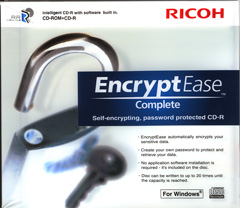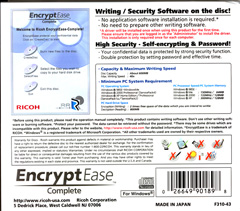Ricoh EncryptEase: CD-R Password Protection Made Easy
by Purav Sanghani on February 7, 2006 12:05 AM EST- Posted in
- Storage
Introduction
The life of the CD-R has hit its peak with many users moving on to higher capacity DVD writeable media for data storage and backup. Whether the use of writeable optical media is for data storage, media, or personal backup, many turn to 3rd party utilities to perform all of these operations.
Over the years as organizations, large and small, began migration of their paper data to electronic media, there came a need to provide protection to their sensitive information. Many used third party software from companies like EMC, Veritas (now merged with Symantec), and newer companies such as Idealstor and Novastor to encrypt and archive their most valuable data. However, all of these 3rd party vendors catered mainly to the enterprise level.
Only recently has desktop storage called on the need for data encryption with those same companies releasing software with both compression and encryption algorithms for the end user. Nowadays, we can all download a copy of WinZip or WinRAR, or purchase a copy of EMC's Retrospect backup software and see a fully functional suite that lets us shrink and protect our data without the enterprise level costs. But what is the next step?
Hybrid Optical Media
Hybrid media is an old idea from the stone age (late 90's), which showed us that a CD could contain more than one type of file system. For example, from information found on the Optical Storage Technology Association's website, the first type of hybrid media was able to store two types of file systems, a PC compatible session and a Mac compatible session. This type of media has been distributed for years by vendors who want to provide compatibility for their products to both types of users.
The second type of hybrid media came to us, which combined on-disc software with the ability to reach out to other sources such as a PC or the internet to retrieve the information that it required to operate.
The newest type of hybrid media is one where there is a stamped session at the beginning of the media and the rest of the disc is free, writeable disc space for additional sessions. This type of media is similar to the first type (where PC/Mac software coexists), in that the physical media is split into the different types of sessions.
How Is This Third Type of Hybrid Media Utilized?
Ricoh Co., LTD. announced their EncryptEase CD-R media in December 2005, which boasted 600MB disc space to store encrypted data with no additional software requirements except for the application located and run off of the disc. Ricoh takes the old hybrid CD idea and pushes it a step further by including a stamped first track occupied by their data encryption/compression software. Take a look at how it works.
The life of the CD-R has hit its peak with many users moving on to higher capacity DVD writeable media for data storage and backup. Whether the use of writeable optical media is for data storage, media, or personal backup, many turn to 3rd party utilities to perform all of these operations.
Over the years as organizations, large and small, began migration of their paper data to electronic media, there came a need to provide protection to their sensitive information. Many used third party software from companies like EMC, Veritas (now merged with Symantec), and newer companies such as Idealstor and Novastor to encrypt and archive their most valuable data. However, all of these 3rd party vendors catered mainly to the enterprise level.
Only recently has desktop storage called on the need for data encryption with those same companies releasing software with both compression and encryption algorithms for the end user. Nowadays, we can all download a copy of WinZip or WinRAR, or purchase a copy of EMC's Retrospect backup software and see a fully functional suite that lets us shrink and protect our data without the enterprise level costs. But what is the next step?
Hybrid Optical Media
Hybrid media is an old idea from the stone age (late 90's), which showed us that a CD could contain more than one type of file system. For example, from information found on the Optical Storage Technology Association's website, the first type of hybrid media was able to store two types of file systems, a PC compatible session and a Mac compatible session. This type of media has been distributed for years by vendors who want to provide compatibility for their products to both types of users.
The second type of hybrid media came to us, which combined on-disc software with the ability to reach out to other sources such as a PC or the internet to retrieve the information that it required to operate.
The newest type of hybrid media is one where there is a stamped session at the beginning of the media and the rest of the disc is free, writeable disc space for additional sessions. This type of media is similar to the first type (where PC/Mac software coexists), in that the physical media is split into the different types of sessions.
How Is This Third Type of Hybrid Media Utilized?
Ricoh Co., LTD. announced their EncryptEase CD-R media in December 2005, which boasted 600MB disc space to store encrypted data with no additional software requirements except for the application located and run off of the disc. Ricoh takes the old hybrid CD idea and pushes it a step further by including a stamped first track occupied by their data encryption/compression software. Take a look at how it works.
 |
 |
| Click to enlarge. | |










18 Comments
View All Comments
MercenaryForHire - Wednesday, February 8, 2006 - link
No crossplatform support, extra driver layers for the optical drives, questionable burning software, and no specified or controllable encryption level. Oh boy, where do I sign up?I'll stick with RAR+PAR2 thanks. If it's good enough for the warez "industry" it's good enough for me.
- M4H
VirtualLarry - Sunday, February 19, 2006 - link
Glad to see I'm not the only one using that solution.. I've had "bad things happen" writing precious data, especially to CD-RWs. PAR2 can be a life-saver.I want to know something though.. instead of a windows-only solution such as Ricoh's - why not mass produce recordable media with a per-disc mfg-unique serial number, perhaps on a bar code imprinted on the inner ring (like GameCube discs have). That would allow, in conjunction with an additional program and key, per-media unique encryption keys. Treat the barcode data like a salt, or use it much like MS's EFS uses per-file keys, derived from some master passphrase (not stored on the media). Wouldn't that make more sense? And please... on CD-Rs? Prehistoric tech these days, for bulk optical data storage.
NeonAura - Tuesday, February 7, 2006 - link
On pages one and five, you say "let's" us do something, etc. In English, the apostraphe indicates a contraction. For example, let's means let us. If you mean lets as in to allow, you say "lets" instead of "let's." A good example: This operation lets us enter the main menu. Please do fix. Thanks.Questar - Tuesday, February 7, 2006 - link
Maybe I'm just stupid, but I found the article very difficult to read. The grammer throughout the article is bad.kmmatney - Tuesday, February 7, 2006 - link
Please shut down the Anandtech web site until all grammatical and spelling errors have been fixed.Phiro - Wednesday, February 8, 2006 - link
Since the speeling and the grammar police are in full force, I will chime in that the article was abit tough to read quickly - the English was abit stilted and the thought processes behind them were a little tough to discern. It also read abit too much like a brochure from Ricoh, and the screenshots were waaay over the top.Also, why would Anandtech be working with Ricoh to bring us the latest in this type of news?
Isn't that just the weirdest thing to say and/or expect from a website like this?
PuravSanghani - Tuesday, February 7, 2006 - link
Thank you for letting us know. "Lets" go ahead and fix the error, shall we?NeonAura - Tuesday, February 7, 2006 - link
You'd use "let's" in that situation. Learn your grammar, son!NeonAura - Tuesday, February 7, 2006 - link
For info, I know that was a joke :PJonB - Tuesday, February 7, 2006 - link
This is aimed at managers and supervisors and directors of companies. They have data that they think should be protected before sending through the mail. Keep in mind, these people are just now getting computers with burners on their desktop or laptop. They only learned how to burn a CD six months ago and they don't care how much a CD costs, just that they can get one from the supply cabinet when needed.If this is marketed properly in trade journals, they'll sell millions. This is encryption for dummies.